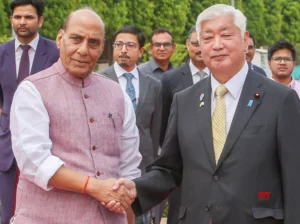The Defence Minister recently held a bilateral meeting with Japan’s Defence Minister, Gen Nakatani, in New Delhi.

Essential Information About Japan
- Capital: Tokyo, situated in the east-central region of Honshu.
- Official Language: Japanese.
- Currency: Japanese Yen.
- Government: A parliamentary system under a constitutional monarchy.
- Geography: An island nation in East Asia, located in the Northwestern Pacific Ocean.
Physical Geography of Japan
- Archipelago Structure: Japan consists of a series of islands stretching about 1,500 miles in a northeast-to-southwest direction.
- Main Islands (from north to south): Hokkaido, Honshu, Shikoku, and Kyushu.
- Maritime Borders:
- East: Pacific Ocean.
- North: Sea of Okhotsk.
- West: Sea of Japan (East Sea).
- Southwest: East China Sea.
- Land Borders: Japan has no land borders, as it is an island nation.
Terrain and Natural Features
- Landscape: More than 80% of Japan is mountainous, with a predominantly rugged terrain.
- Volcanic Activity: Situated along the Pacific Ring of Fire, Japan experiences significant earthquake activity and active volcanoes.
- Highest Peak: Mount Fuji, a stratovolcano standing at 3,776 meters, is the tallest mountain and a national symbol.
- Major Mountain Ranges: The Japanese Alps.
- Major Rivers: Shinano River (the longest), Tone River, Kiso River.
Climate
- Climatic Zones: Japan’s climate ranges from subarctic in the north to humid subtropical in the south.
- Natural Disasters: The country frequently faces earthquakes, tsunamis, and volcanic eruptions due to its position on tectonic plates.




